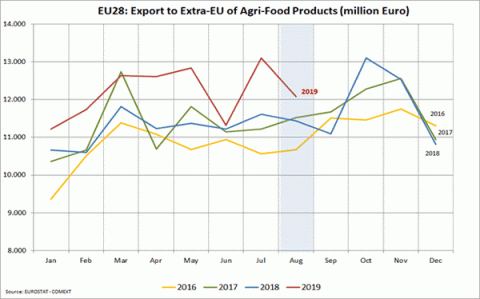
The value of the EU’s agri-food exports in August 2019 reached €12.07 billion, marking a rise of 5.6% compared to August 2018. As the value of imports decreased by 0.2% to €9.14 billion, the agri-food trade surplus for August stood at €2.93 billion, a 29% increase in the positive trade balance compared to last year’s figures. These are some of the main findings of the monthly trade report for August 2019, published today by the European Commission.
Comparing the monthly export values of August 2019 with August 2018, the highest increases were recorded for China (up €283 million), the USA (a rise of €192 million), and Japan (an increase of €69 million). However, significant falls were recorded in the EU’s exports to Hong Kong, Libya (both down by €66 million) and Algeria (down €48 million).
In terms of imports, there was a rise in the value of the EU’s agri-food intake from Ukraine (up by €198 million), Brazil (rising by €94 million), and Canada (an increase of €74 million). At the other end of the table, there was a drop in the value of imports from the USA (down by €153 million), South Africa (a decrease of €59 million), and Indonesia (a fall of €51 million).
There was an increase in the export values of a number of product categories, including wheat (a jump of €142 million), pork (rising by €132 million), spirits and liqueurs (up €125 million), milk powders and whey (a rise of €82 million), and cheese (up by €52 million). By contrast, there was a marked decrease in exports for live animals (€74 million), beet and sugar cane (down €52 million), raw hides and skins (€31 million), vegetable oils (excluding palm and olive oil) (a drop of €21 million), and beer (down €20 million).
Increases in imports were recorded for oilseeds (other than soyabeans) (up €147 million), coarse cereals (an increase of €113 million), ethanol (a rise of €42 million), wheat (up by €42 million), and beet and cane sugar (up €41). Meanwhile, there was a decline in the value of a number of imports, including unroasted coffee and tea (down €103 million), soyabeans (a fall of €58 million), palm oil (a drop of €49 million), citrus fruit (a decrease of €48 million), and fruit juices (down €43 million).